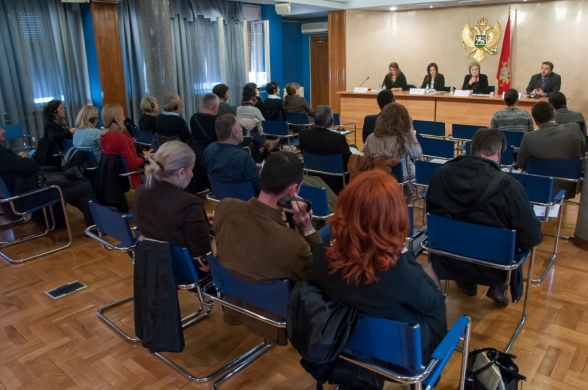Committee on European Integration today organised a public debate on the topic “Montenegro and the EU: Negotiations on chapters 11 - Agriculture and rural development and 12 - Food safety, veterinary and phytosanitary policy”.
The moderator of the debate was Ms Marija Maja Ćatović, Deputy Chairperson of the Committee on European Integration, while the following talked about the acquis and implementation of obligations arising from these chapters: Mr Benoit Esmanne, Programme Manager for Agriculture and Rural Development at the EU Delegation to Montenegro, Ms Danijela Stolica, Director General of Directorate for Agriculture and Fisheries at the Ministry of Agriculture and Rural Development and negotiator for chapters 11 and 12, Ms Zorka Prljević, Director of Phytosanitary Directorate and Head of Working Group for Chapter 12.
With regard to the field of agriculture and rural development, the panellists pointed out that this chapter was one of the most significant, because of considerable funds allocated for Common Agricultural Policy at the EU level. With regard to Montenegro, it was important to increase the export of agricultural products, especially traditional products which could be competitive in the European market. In order to achieve this goal, strengthening of administrative and professional capacities was necessary, and in that respect study visits of agricultural producers to the EU states strongly contributed to this. Furthermore, it was emphasised that Montenegro had the obligation of founding a payment agency, and according to Mr Esman, during their recent visit to Montenegro, the auditors of the European Commission's Directorate General for Agriculture and Rural Development determined that the country was on a good path towards establishing that institution.
According to the panellists, the Chapter 12 - Food safety, veterinary and phytosanitary policy represented one of the most demanding with regard to the scope of legislation, bearing in mind that the largest part of acts from Montenegro’s EU Accession Programme was envisaged precisely in this field. With regard to strengthening of administrative capacities, it was pointed out that the forming of Food Safety Administration was underway, since the European Commission recommended establishing a single institution for implementing all forms of food safety control.
The participants in the discussion pointed out that strengthening of abilities of agricultural producers to apply for EU funds and to provide funds for co-financing projects should be worked on. The need for agricultural producers to be directly involved in drafting of laws and secondary legislation related to them was pointed out, but also the need for improvement of statistics in this field. Furthermore, the significance of improving the system of agricultural production gained more importance in the context of negative effects that the climate change would also have on Montenegro in the future.
The debate was organised ahead of the upcoming meeting of the Committee, which would be closed for public, and where drafts of negotiating positions for the said chapters would be considered.









